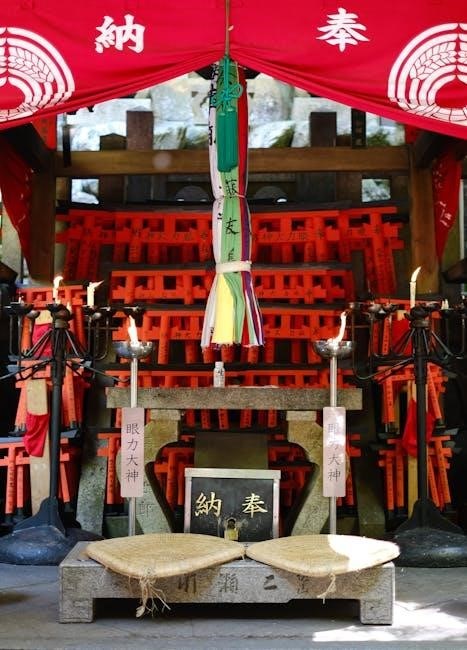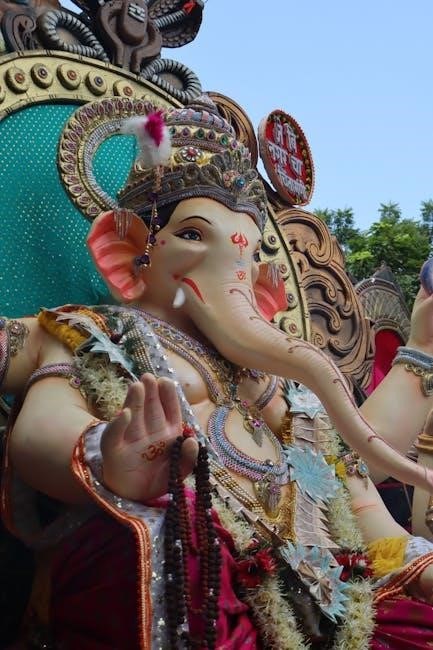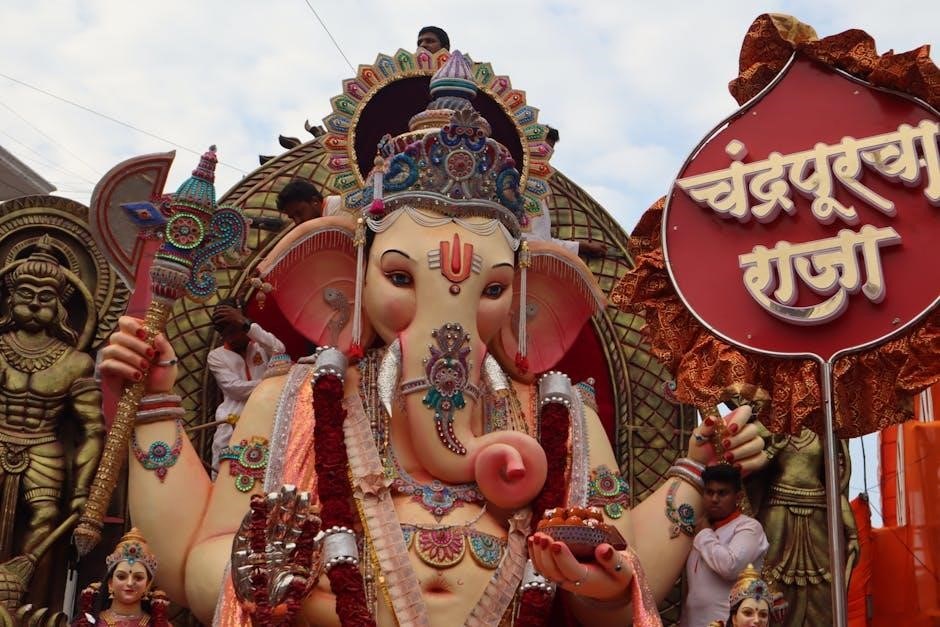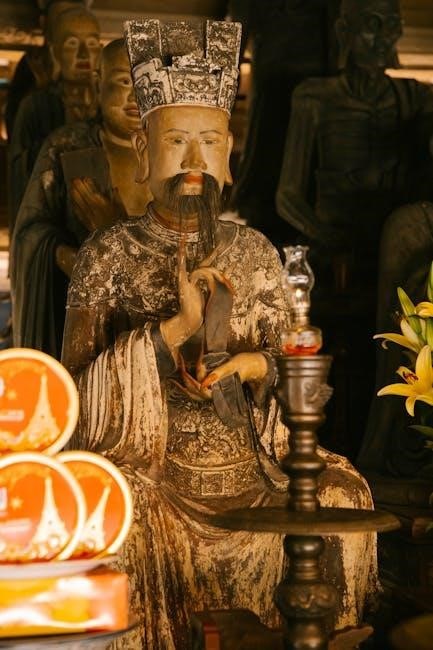Kappa Kappa Psi is a national, co-educational fraternal organization dedicated to serving college and university bands. Founded in 1919, it emphasizes service, leadership, and Rituals.
1.1 Overview of Kappa Kappa Psi

Kappa Kappa Psi is a national, co-educational fraternal organization founded in 1919 to support college and university bands. It emphasizes service, leadership, and musical growth, fostering unity among band members. The fraternity is honorary in nature, recognizing dedication and service to bands. Membership is earned through a structured education program and formal initiation. Rituals play a central role in the fraternity’s identity, reinforcing its values and traditions. Kappa Kappa Psi operates through local chapters, providing opportunities for personal development and service. Its mission is to promote the welfare of band programs and empower members to lead and inspire their communities.
1.2 The Importance of Rituals in Kappa Kappa Psi
Rituals are central to Kappa Kappa Psi’s identity, serving as a foundation for unity, shared values, and spiritual growth. These ceremonies are designed to inspire members, foster camaraderie, and uphold the fraternity’s mission. The Rituals, divided into three degrees, symbolize the journey of membership, from education to initiation. They emphasize service, leadership, and musicianship, while preserving the fraternity’s traditions. Rituals also provide a sense of belonging and continuity, connecting members across generations. By participating in these sacred ceremonies, members deepen their understanding of the fraternity’s purpose and commitment to its ideals. Rituals are a cornerstone of Kappa Kappa Psi’s enduring legacy.

The History of Kappa Kappa Psi and Its Rituals
Kappa Kappa Psi, founded in 1919, has a rich history intertwined with its Rituals, which have evolved to reflect the fraternity’s values and traditions over time.
2.1 Founding and Evolution of the Fraternity
Kappa Kappa Psi was founded on November 27, 1919, at Oklahoma A&M College (now Oklahoma State University) by a group of band members. Initially an all-male organization, it evolved into a co-educational fraternity in 1977, reflecting broader societal changes. The fraternity’s early years focused on establishing its national constitution and developing traditions that would shape its identity. Over time, Kappa Kappa Psi expanded its mission to include leadership, service, and musical excellence, while maintaining its core values. The evolution of the fraternity has been marked by adaptability, ensuring its relevance in supporting college bands and fostering a sense of community among its members.
2.2 Historical Development of the Ritual
The Ritual of Kappa Kappa Psi has undergone significant development since its inception, reflecting the fraternity’s growth and values. Initially, the Ritual was designed to instill a sense of unity and purpose among members. Over the years, revisions have been made to align with the evolving mission of the fraternity, with notable updates occurring at the 2017 National Convention. The Ritual’s historical development emphasizes the importance of tradition while adapting to modern contexts. It serves as a cornerstone of membership education, ensuring that the fraternity’s core values are passed down through generations. The Ritual’s evolution is a testament to its enduring relevance.
Structure of the Kappa Kappa Psi Ritual
The Ritual consists of three Degrees, each emphasizing symbolism and themes that guide members through fraternal values, service, and unity, fostering lifelong commitment.
3.1 The Three Degrees of the Ritual
The Ritual of Kappa Kappa Psi is divided into three degrees, each designed to educate and inspire members. The first degree introduces foundational values and symbolism, while the second delves deeper into fraternal principles. The third degree culminates in formal initiation, revealing the organization’s highest secrets. These degrees ensure a progressive understanding of the fraternity’s mission and foster a lifelong commitment to service and leadership. Each degree is a pivotal step in the member’s journey, reinforcing the bond within the brotherhood and preparing individuals for active participation in the fraternity’s activities and traditions.

3.2 Symbolism and Themes in the Ritual
The Ritual of Kappa Kappa Psi is rich in symbolism, with elements like the lyre, baton, and keys representing harmony, leadership, and unity. Colors such as scarlet and gold signify passion and excellence. These symbols are integral to the Ritual, reinforcing themes of brotherhood, service, and musical excellence. The ceremonies are designed to inspire members, fostering a deep connection to the fraternity’s mission. Through these symbols and themes, the Ritual creates a shared identity among members, guiding their actions and commitments to the organization and its ideals.
Ritual Performance and Education
The Ritual Performance and Education Committee ensures proper execution of ceremonies, guiding chapters in upholding traditions. Virtual Rituals maintain secrecy and safety while fostering meaningful experiences.
4.1 The Role of the Ritual Performance and Education Committee
The Ritual Performance and Education Committee plays a pivotal role in maintaining the integrity and consistency of Kappa Kappa Psi’s Rituals. This committee serves as a resource for chapters, providing guidance on Ritual execution, education, and performance. They ensure that all ceremonies align with the fraternity’s values and traditions. Additionally, the committee develops educational materials and conducts workshops to deepen members’ understanding of the Ritual’s significance. Their efforts are crucial in preserving the fraternity’s heritage while adapting to modern needs, ensuring that the Ritual remains a meaningful and unifying experience for all members.

4.2 Virtual Ritual Experiences and Their Significance
Virtual Ritual experiences have become a vital component of Kappa Kappa Psi’s operations, ensuring continuity of traditions while prioritizing member safety. These experiences allow chapters to conduct Rituals securely, maintaining secrecy and integrity. The Ritual Performance and Education Committee plays a key role in organizing these virtual events, providing guidance and resources to chapters. Virtual Rituals foster unity and shared understanding among members, even when in-person gatherings are not possible. They serve as a modern adaptation of timeless traditions, ensuring the fraternity’s legacy endures in a changing world. This approach reflects Kappa Kappa Psi’s commitment to innovation and inclusivity while preserving its core values.

Ceremonial Items and Preparation
Required items include Ritual Books, official insignia, and ceremonial attire. Chapters must prepare an altar with scarlet cloth and ensure all materials align with Ritual standards. The Kappa Psi Store offers necessary products to uphold tradition and grandeur, providing everything needed for a dignified and authentic Ritual experience.
5.1 Required Ritual Books and Insignia
The official Ritual Books are essential for all ceremonies, containing the complete text of the Ritual and its symbolism. These books must be kept secure under lock and key when not in use. Insignia, such as the official crest and regalia, are also required to maintain the integrity and dignity of the Ritual. Chapters are provided with these items through the Kappa Psi Store, ensuring consistency and authenticity. Proper preparation of these materials is vital to uphold the traditions and values of Kappa Kappa Psi, ensuring a meaningful and respectful experience for all members involved in the ceremonies.
5.2 Ritual Checklist for Chapters
To ensure rituals are conducted properly, chapters must maintain a detailed checklist. This includes securing Ritual Books, official insignia, and ceremonial items like the altar with a scarlet cloth. Each chapter must have at least 8-10 Ritual Books, the official crest, and all necessary regalia. The checklist also verifies the presence of active members required for the ceremony and ensures the venue is appropriately prepared. Ritual dates must be finalized by the second meeting of each semester, and all materials must be reviewed for accuracy. This checklist ensures consistency and adherence to Kappa Kappa Psi’s traditions, guaranteeing a meaningful and respectful experience for all participants.

Membership Education and Initiation
Membership education and initiation are pivotal in Kappa Kappa Psi, involving a comprehensive program followed by the formal Third Degree Ritual, marking the transition to full membership.
6.1 The Membership Education Program
The Membership Education Program in Kappa Kappa Psi is designed to prepare candidates for initiation through structured learning experiences. It focuses on the history, values, and traditions of the fraternity, ensuring members understand their role in serving college bands. The program includes sessions on Ritual symbolism, fraternity operations, and leadership development. Active members and advisors guide candidates through this journey, fostering a sense of community and shared purpose. Completion of the program is a prerequisite for initiation, marking a candidate’s readiness to embrace the fraternity’s mission and values fully.
6.2 Formal Initiation and the Third Degree Ritual
Formal initiation into Kappa Kappa Psi culminates in the Third Degree Ritual, a sacred ceremony where candidates are fully welcomed as active members. This ritual reveals the fraternity’s deepest secrets and signifies a member’s commitment to its values. The Third Degree is conducted with precision, adhering to the guidelines outlined in the Ritual Books. Members are sworn to secrecy, ensuring the integrity of the fraternity’s traditions. The initiation process is a transformative experience, fostering unity and dedication among members. Completion of the Third Degree marks the final step in becoming a lifelong member of Kappa Kappa Psi.
The Role of Ritual in Modern Times
Rituals remain vital in Kappa Kappa Psi, adapting to modern needs while preserving tradition. Virtual events ensure continuity, maintaining the fraternity’s values and member engagement in a changing world.
7.1 Adapting Rituals for In-Person and Virtual Events
Kappa Kappa Psi has successfully adapted its Rituals to accommodate both in-person and virtual events. Virtual Ritual experiences, led by the Ritual Performance and Education Committee, ensure secure and secret ceremonies while maintaining member safety. These adaptations allow chapters to uphold traditions without compromising the integrity of the Ritual. In-person events are conducted with strict safety protocols, ensuring a meaningful experience for all participants. This dual approach reflects the fraternity’s commitment to preserving its heritage while embracing modern technology to meet the needs of its members in a rapidly changing world.
7.2 Ensuring the Secrecy and Integrity of the Ritual
The secrecy and integrity of Kappa Kappa Psi’s Ritual are paramount. Members are sworn to uphold confidentiality, and Ritual Books are stored securely, accessible only during authorized ceremonies. Virtual Rituals utilize secure platforms to maintain secrecy while ensuring member safety. The fraternity emphasizes ethical practices, with strict guidelines to prevent unauthorized disclosure; Education and training programs reinforce the importance of protecting the Ritual’s sanctity. By adhering to these measures, Kappa Kappa Psi preserves the meaningfulness and exclusivity of its traditions, ensuring their enduring significance for future generations.

Kappa Kappa Psi’s Rituals remain central to its identity, fostering unity and purpose. The fraternity continues to evolve, ensuring its traditions endure while addressing modern challenges.
8.1 The Enduring Significance of the Kappa Kappa Psi Ritual
The Ritual of Kappa Kappa Psi remains a cornerstone of the fraternity, embodying its core values and traditions. It fosters unity, shared identity, and a deep commitment to service and leadership. Through its symbolic ceremonies, the Ritual reinforces the fraternity’s mission and inspires members to uphold its legacy. Despite modern adaptations, the Ritual’s essence has endured, preserving the organization’s historical roots while engaging contemporary members. Its significance lies in its ability to connect generations, ensuring that the fraternity’s principles continue to guide its members. The Ritual is not just a ceremony but a living tradition that shapes the fraternity’s future.

8.2 Looking Ahead: The Future of Rituals in Kappa Kappa Psi
The future of Kappa Kappa Psi’s Rituals lies in balancing tradition with innovation. As the fraternity adapts to modern challenges, virtual Ritual experiences will continue to play a crucial role, ensuring accessibility and safety. The Ritual Performance and Education Committee will remain instrumental in guiding these evolutions, maintaining the integrity and secrecy of the Ritual. Emphasizing education and member engagement will be key to preserving the Ritual’s relevance. By blending timeless values with contemporary practices, Kappa Kappa Psi will ensure its Rituals inspire future generations, fostering unity and purpose among its members. The fraternity’s commitment to adaptability will safeguard its legacy for years to come.
